
Sacraments
Sacraments are central for Catholics. They help us meet the incarnate Jesus, who comes to us through cleansing water and invigorating oil to welcome us, life-giving bread and wine that become Christ’s Body and Blood, a hand outstretched in forgiveness, vows lovingly exchanged in marriage, a hand designating someone for ordained service and oil to strengthen the sick and comfort the dying.
The Latin word sacramentum means “a sign of the sacred.”
There are 7 sacraments and each points to what is sacred, significant and important for Christians. They are special occasions for experiencing God’s saving presence. That is what theologians mean when they say that sacraments are at the same time signs and instruments of God’s grace.
According to the Catechism of the Catholic Church, “Celebrated worthily in faith, the sacraments confer the grace that they signify. They are efficacious because in them Christ himself is at work; it is he who baptises, he who acts in his sacraments in order to communicate the grace that each sacrament signifies”.
Baptism
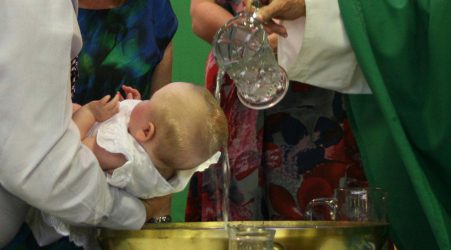
Baptisms are usually held on Saturdays at 11am and must be booked well in advance.
Please note that families must belong to the parish in order for a Baptism to be held in our church.
Baptism is the first step in a lifelong journey of commitment and discipleship. Through baptism we are freed from the darkness of our world, we become sons and daughters of God and are embraced into the family of the Church.
Baptism removes the guilt and effects of Original Sin and incorporates the baptised into the Church, the Mystical Body of Christ on earth.
Catholic families are encouraged to baptise their children soon after birth, however sometimes people are baptised later, or even as adults.
Whether we are baptised as infants or adults, Baptism is the Church’s way of celebrating and enacting the embrace of God.
Click here for an application form (PDF and will open in a new window). Print the form, complete it, and return to the Parish Office.
Phone enquiries can also be made by contacting the parish secretary on 8264 4694. Office hours are 9am – 3.30pm everyday except Tuesdays.
Click here for common questions about Baptism. (Opens in a new window)
Confirmation

Confirmation is the second of the three sacraments of initiation. It is a Catholic Sacrament of mature Christian commitment and a deepening of baptismal gifts.
The Sacrament of Confirmation completes the Sacrament of Baptism.
If Baptism is the sacrament of re-birth to a new and supernatural life, Confirmation is the sacrament of maturity and coming of age.
Confirmation is a sacrament of empowerment. It gives the strength to follow Jesus and to become involved in the mission which Jesus left to the Church.
Children must be at least 7 years of age.
For adult converts, it is performed during the final stage after completion of the Rite of Christian Initiation of Adults (RCIA) program.
It includes the laying on of hands in prayer and blessing and the anointing of the forehead with Chrism (holy oil) with the words: “Be sealed with the gifts of the Holy Spirit.” In doing so, the person is ‘sealed’ as a member of the church.
The outward rite of confirmation signifies the inner presence of the Holy Spirit who is believed to provide the strength to live out a life of faith.
At confirmation a Catholic may symbolically take the name of a saint to be his or her patron.
Click here for common questions about Confirmation. (Opens in a new window)
Eucharist
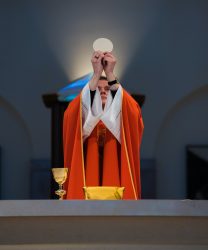
The sacrament of Eucharist brings to completion the Christian process of initiation. It is the central rite of Catholic worship.
In this sacrament we remember what Jesus did for us in his life, death and resurrection. We remember particularly the Last Supper, that final meal Jesus shared with his disciples. At that meal Jesus gave us the Eucharist so that we could remember him in a special way. When we receive Communion, we believe that we receive the person of Jesus into our very beings. We become one with him, and we become one with each other. As a community we become ‘the body of Christ’.
Special lay ministers (non-priests) called Extra-ordinary Ministers of the Eucharistic are trained to help the priest distribute communion to the congregation during Mass.
Both priests and special ministers also bring Holy Communion to the sick and the homebound so that all Catholics can participate.
A person may received the Eucharist daily, or as often as they feel the need.
NOTE : If you are sick and would like to receive holy communion, please contact the Parish Office.
Click here for common questions about the Eucharist. (Opens in a new window)
Reconciliation
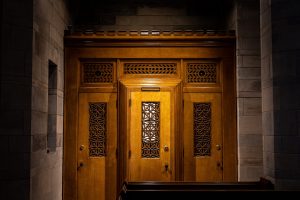
This sacrament is one of the two sacraments of healing (the other is the Anointing of the Sick).
Also known as Confession, Reconciliation is seen as an opportunity for renewal and can be done as often as needed. Some Catholics participate weekly before receiving the Eucharist, whereas others may seek the sacrament only during the seasons of Lent or Advent.
The penitent is not confessing to the priest, but to God. The priest is there to be a ‘conduit’ between you and God.
Reconciliation is a means of obtaining pardon from God for sins for which the sinner is truly remorseful, and brings the sinner back into communion with God and the Church. The sacrament is an opportunity for self-reflection and requires that the person take full responsibility for his or her sins, both those in thought and in action. During the rite, sins are recounted privately to a priest, who is seen as a healer aiding the process and assigns acts of penance, such as specific prayers or acts of restitution, to complete in the following days.
A prayer of contrition is offered at the end of the confession and the newly absolved Catholic is urged to refrain from repeating those sins.
Please see the Mass Times page for details about reconciliation times at St David’s.
In preparation for the Easterand Christmas seasons, additional reconciliation opportunities will be listed in the Parish bulletin.
Click here for common questions about Reconciliation. (Opens in a new window)
Marriage

Marriage is an important religious event. It is a public sign that one gives oneself totally to another person.
It is also a public statement about God: the loving union of husband and wife speaks of family values and also God’s values. As such, preparing for marriage often means some deep reflection on how God fits into your life, your future and of course, your marriage.
The wedding ceremony will express your belief that God will be with you to support you in your life together.
For a wedding in the Catholic church at least one of the couple must be a baptised Catholic.
Couples who plan to get married in the Catholic church are encouraged to participate in the pre-marital counselling. If you have been previously married in either a civil or religious ceremony make sure you discuss this with the Priest at the first meeting.
Marriage preparation is a very busy time. Most couples find this to be exciting as they watch their plans unfold before them. The Catholic Church shares your joy as you begin this new phase of your journey, and there may be some aspects of the Church that are new to you. The Catholic Church enables couples to reflect on what they promise each other.
Marriages must be booked 6 months in advance.
For bookings and other information, please contact the Parish Secretary on 8264 4694.
Click here for common questions about Marriage. (Opens in a new window)
Holy Orders
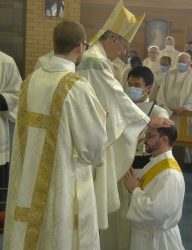
Holy Orders is the sacrament by which deacons, priests and bishops are ordained and receive the power and grace to perform their sacred duties.
The three levels of the sacrament are the diaconate (deacon), the priesthood (priest) and the episcopate (bishop).
Fr. Joshua Nash is the first of our parishioners to be born and raised within the parish, was educated in our schools, had all the sacraments within our church, and then to become a priest. The graphic is the moment he was Ordained a Priest by Bishop Mark Edwards OMI.
Click here for what it is like inside a Seminary. (Opens in a new window)
If you have a desire to become an Oblate of Mary Immaculate, contact the Vocations Co-ordinator at vocations@oblates.com.au
or visit the OMI website.
Anointing of the Sick
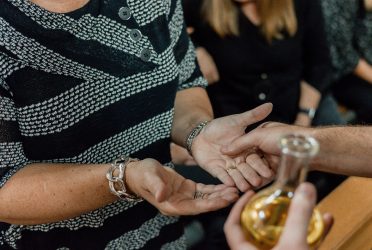
When a Catholic is very sick, the Church anoints the person with oil in a special ritual of healing called Anointing of the Sick.
Traditionally referred to as Extreme Unction or Last Rites, the Sacrament of the Anointing of the Sick is administered both to the dying and to those who are gravely ill.
It can also be administered to those who are about to undergo surgery, for the recovery of their health and for spiritual strength.
It is a ritual of healing appropriate not only for physical but also for mental and spiritual sickness.
It is administered by anointing with blessed oil accompanied by prayer. Only a priest can validly administer it. Its effect is the strengthening of the soul, often of the body as well, and in the necessary conditions for the remission of sins.
This rite is one way in which the Church continues the healing ministry of Jesus. The healing offered by this anointing is forgiveness of sins, hope and inner peace, sometimes physical healing, and an assurance of God’s steadfast care, even in death.
There are times throughout the year when general anointing takes place in the church.
To request an annointing at other times, contact the Parish Office on 8264 4694.
